Venezuela regains control of its most violent prisons
The government is assuring the public that the country’s prisons — where criminal groups have planned kidnappings, extortion and murders — are now under its control
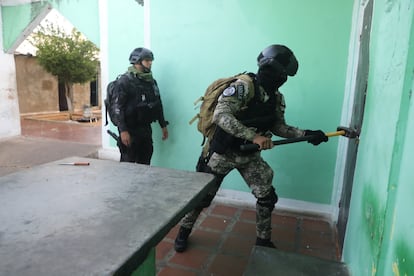
The government of Venezuela has announced that it has regained control of its most violent prisons, while establishing a new military-like regime within the facilities. Minister of Interior and Justice Remigio Ceballos has assured the public that the authorities concluded a “successful” takeover of the Vista Hermosa prison, located in Ciudad Bolívar, about eight hours from Caracas. This was within the framework of an operation designed to dismantle the dense branches of organized crime that exist in the hellish Venezuelan prison system.
“The work is done, we’ve put an end to all the criminal structures that were [operating within the facilities]. We will soon provide additional information about what we’ve found. We already have the most populated penitentiaries under control,” Ceballos stated, in a video posted on social media. Footage also shows him touring the correctional facilities.
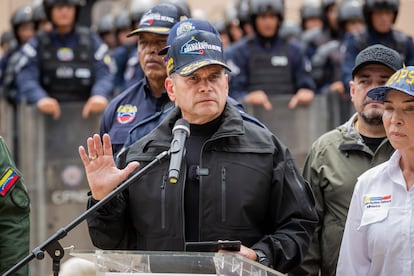
Before Vista Hermosa — in a somewhat spectacular operation reminiscent of President Bukele’s rule in El Salvador — hundreds of military and police officials announced that the state was regaining control of four prisons (Tocorón, Tucuyito, La Pica and Puente Ayala) that have become infamous in recent decades for being centers of organized crime. The criminal groups — who have long dominated these facilities — have planned kidnappings, extortion and murder from inside. They have even financed the construction of nightclubs and restaurants in the jails.
In the prisons, the authorities announced that they found all kinds of weapons — including machine guns and hand grenades — during the raids. In La Pica prison — near Maturín, in the east of the country — the authorities found a type of call center, with many cubicles and telephones, in which numerous scams and virtual kidnappings were carried out by inmates.
The takeover brings with it the transfer of many of these prisoners to other centers, which are already quite overcrowded. According to the Ministry of the Prison Service, the plan now calls for the establishment of lockdowns and a military-style protocol, which will involve uniforms and drills.
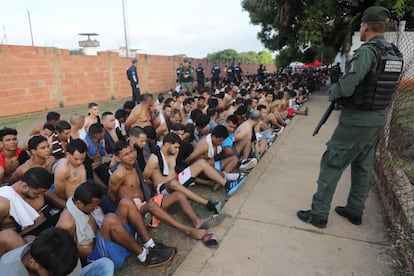
These prisons — along with the Trujillo and San Felipe jails, which are set to be taken next — saw well-known gangs exercise their dominance. The true authorities in each prison were the criminal leaders, who collected taxes from low-level prisoners. One of the notorious figures who ran these facilities was “El Niño” Guerrero, the leader of El Tren de Aragua, a brutal gang that operates in several Latin American countries beyond Venezuela. He escaped from Tocorón prison in September, around the time that the authorities did a raid.
Luis Izquiel — a lawyer and criminologist — acknowledges that these new measures can translate into relief when it comes to placing incarcerated criminal groups under siege. However, he notes that the Chavista administration — which has been in power uninterruptedly since 1999, first under Hugo Chávez (1999-2013) and now Nicolás Maduro (2013-present) — is trying to remedy a situation that has been out of control for decades, having grown to inconceivable levels over the last two administrations. Izquiel doubts that any of these measures will have any permanent effect on combating crime.
“[Prison mafias] saw the light of day during the reign of Chavismo,” Izquiel points out, noting that the phenomenon was born in the Vista Hermosa prison about 15 years ago. “What we now have to see is whether [the newly-implemented] measures will correct the serious problems of the penitentiary system and if they will prevent the occurrence of crime in the future.”
The decisions — announced by the Ministry of the Interior and Justice — have been received with surprise and disbelief among the general population. Venezuelans have grown accustomed over the years to hearing about the Dantesque versions of the prison system. The government never seemed overly disturbed by the issue before.
Many relatives of prisoners have protested the new regulations, which involve the transfer of numerous inmates. The shifting of many of them, Izquiel points out, will result in more procedural delays.
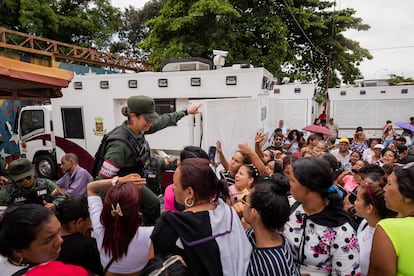
Humberto Prado — from the Venezuelan Prison Observatory (OVP) — has a suspicion about the true intentions of the government. He alludes to the fact that the Maduro regime needs to create “a new information agenda” with these apparently spectacular procedures, so as to counteract the investigations by the International Criminal Court into Venezuela… and to ward off potential political opponents.
“For many years,” Prado emphasizes, “there was a clear network of complicity between crime and various levels of the Venezuelan state, in the Prosecutor’s Office, in the courts, in the Ombudsman’s Office. The [criminal mafias] multiplied when Tarek El Aissami was minister of the interior.”
“These decisions are going to terribly aggravate the problem of overcrowding,” Prado sighs. “Half of the country’s prisoners are currently stuck in police stations and checkpoints, crowded together without knowing anything about their cases.”
The new carceral measures are unusual in the traditional procedures of Chavismo. Aimed at dismantling prison operations and murdering known gangsters, the new policies have consolidated a clear decrease in all types of crime across the country, for the first time in 30 years. Prisoner riots and prison massacres have also occurred with less frequency and intensity.
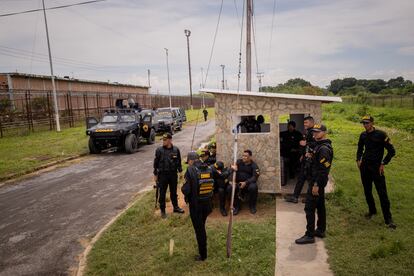
Sign up for our weekly newsletter to get more English-language news coverage from EL PAÍS USA Edition
Tu suscripción se está usando en otro dispositivo
¿Quieres añadir otro usuario a tu suscripción?
Si continúas leyendo en este dispositivo, no se podrá leer en el otro.
FlechaTu suscripción se está usando en otro dispositivo y solo puedes acceder a EL PAÍS desde un dispositivo a la vez.
Si quieres compartir tu cuenta, cambia tu suscripción a la modalidad Premium, así podrás añadir otro usuario. Cada uno accederá con su propia cuenta de email, lo que os permitirá personalizar vuestra experiencia en EL PAÍS.
¿Tienes una suscripción de empresa? Accede aquí para contratar más cuentas.
En el caso de no saber quién está usando tu cuenta, te recomendamos cambiar tu contraseña aquí.
Si decides continuar compartiendo tu cuenta, este mensaje se mostrará en tu dispositivo y en el de la otra persona que está usando tu cuenta de forma indefinida, afectando a tu experiencia de lectura. Puedes consultar aquí los términos y condiciones de la suscripción digital.








































